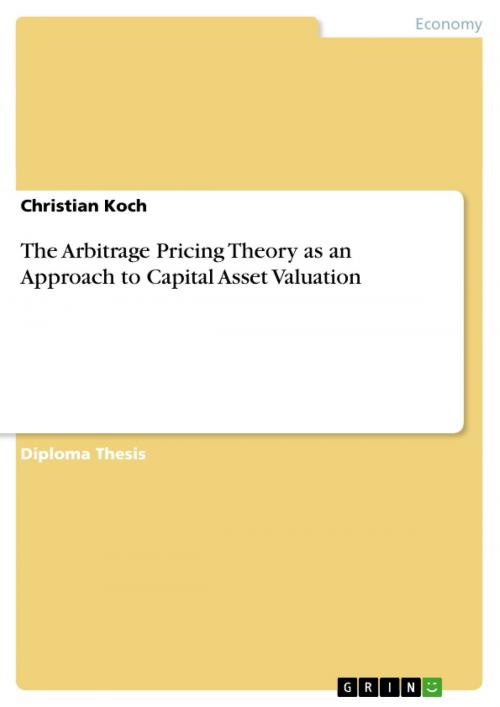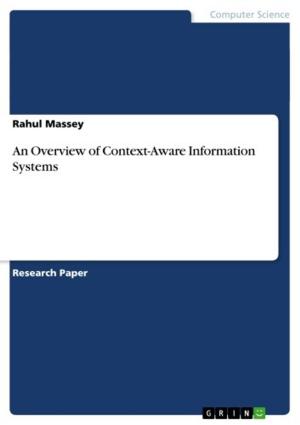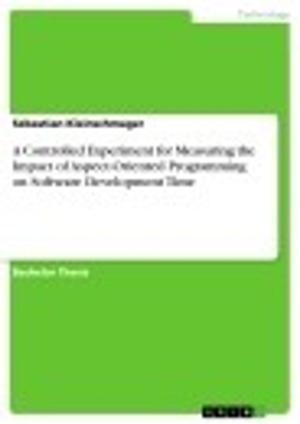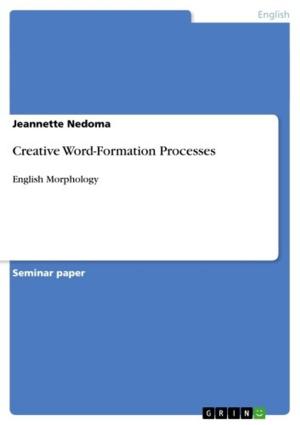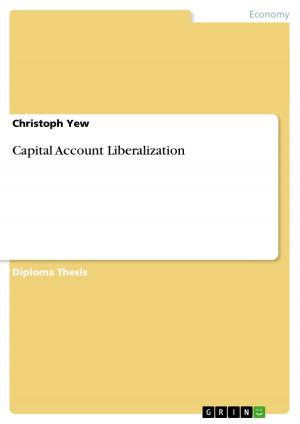The Arbitrage Pricing Theory as an Approach to Capital Asset Valuation
Business & Finance, Finance & Investing, Banks & Banking| Author: | Christian Koch | ISBN: | 9783640277186 |
| Publisher: | GRIN Publishing | Publication: | February 27, 2009 |
| Imprint: | GRIN Publishing | Language: | English |
| Author: | Christian Koch |
| ISBN: | 9783640277186 |
| Publisher: | GRIN Publishing |
| Publication: | February 27, 2009 |
| Imprint: | GRIN Publishing |
| Language: | English |
Diploma Thesis from the year 1996 in the subject Business economics - Banking, Stock Exchanges, Insurance, Accounting, grade: 1,3, European Business School - International University Schloß Reichartshausen Oestrich-Winkel, 160 entries in the bibliography, language: English, abstract: A 'few surprises' could be the trivial answer of the Arbitrage Pricing Theory if asked for the major determinants of stock returns. The APT was developed as a traceable framework of the main principles of capital asset pricing in financial markets. It investigates the causes underlying one of the most important fields in financial economics, namely the relationship between risk and return. The APT provides a thorough understanding of the nature and origins of risk inherent in financial assets and how capital markets reward an investor for bearing risk. Its fundamental intuition is the absence of arbitrage which is, indeed, central to finance and which has been used in virtually all areas of financial study. Since its introduction two decades ago, the APT has been subject to extensive theoretical as well as empirical research. By now, the arbitrage theory is well established in both respects and has enlightened our perception of capital markets. This paper aims to present the APT as an appropriate instrument of capital asset pricing and to link its principles to the valuation of risky income streams. The objective is also to provide an overview of the state of art of APT in the context of alternative capital market theories. For this purpose, Section 2 describes the basic concepts of the traditional asset pricing model, the CAPM, and indicates differences to arbitrage theory. Section 3 constitutes the main part of this paper introducing a derivation of the APT. Emphasis is laid on principles rather than on rigorous proof. The intuition of the pricing formula and its consistency with the state space preference theory are discussed. Important contributions to the APT are classified and briefly reviewed, the question of APT's empirical evidence and of its risk factors is attempted to be answered. In Section 4, arbitrage theory is linked to traditional as well as to innovative valuation methods. It includes a discussion of the DCF method, arbitrage valuation and previews an option pricing approach to security valuation. Finally, Section 5 concludes the paper with some practical considerations from the investment community.
Diploma Thesis from the year 1996 in the subject Business economics - Banking, Stock Exchanges, Insurance, Accounting, grade: 1,3, European Business School - International University Schloß Reichartshausen Oestrich-Winkel, 160 entries in the bibliography, language: English, abstract: A 'few surprises' could be the trivial answer of the Arbitrage Pricing Theory if asked for the major determinants of stock returns. The APT was developed as a traceable framework of the main principles of capital asset pricing in financial markets. It investigates the causes underlying one of the most important fields in financial economics, namely the relationship between risk and return. The APT provides a thorough understanding of the nature and origins of risk inherent in financial assets and how capital markets reward an investor for bearing risk. Its fundamental intuition is the absence of arbitrage which is, indeed, central to finance and which has been used in virtually all areas of financial study. Since its introduction two decades ago, the APT has been subject to extensive theoretical as well as empirical research. By now, the arbitrage theory is well established in both respects and has enlightened our perception of capital markets. This paper aims to present the APT as an appropriate instrument of capital asset pricing and to link its principles to the valuation of risky income streams. The objective is also to provide an overview of the state of art of APT in the context of alternative capital market theories. For this purpose, Section 2 describes the basic concepts of the traditional asset pricing model, the CAPM, and indicates differences to arbitrage theory. Section 3 constitutes the main part of this paper introducing a derivation of the APT. Emphasis is laid on principles rather than on rigorous proof. The intuition of the pricing formula and its consistency with the state space preference theory are discussed. Important contributions to the APT are classified and briefly reviewed, the question of APT's empirical evidence and of its risk factors is attempted to be answered. In Section 4, arbitrage theory is linked to traditional as well as to innovative valuation methods. It includes a discussion of the DCF method, arbitrage valuation and previews an option pricing approach to security valuation. Finally, Section 5 concludes the paper with some practical considerations from the investment community.
